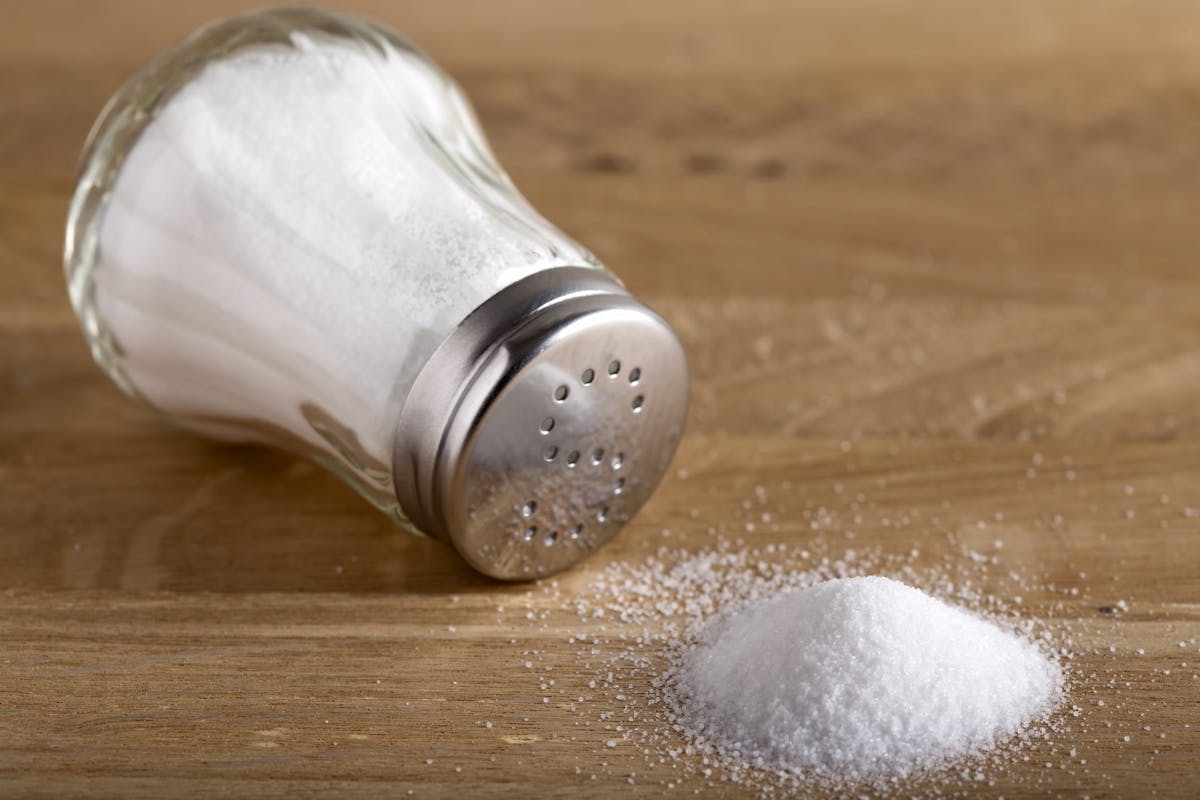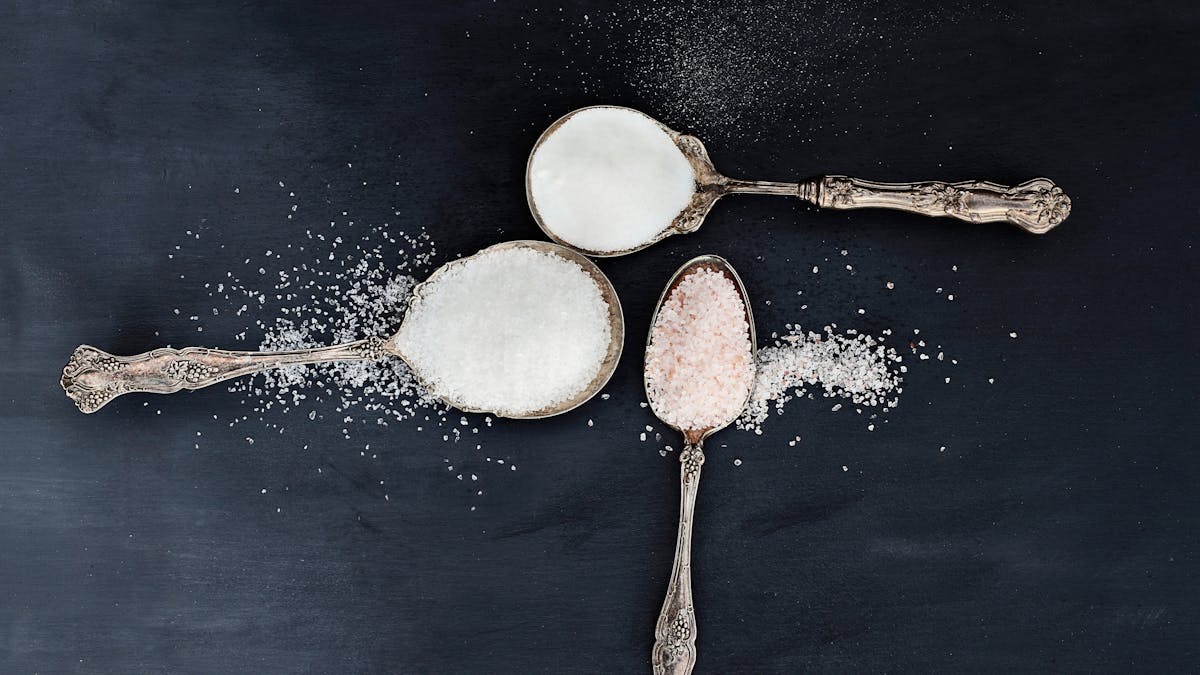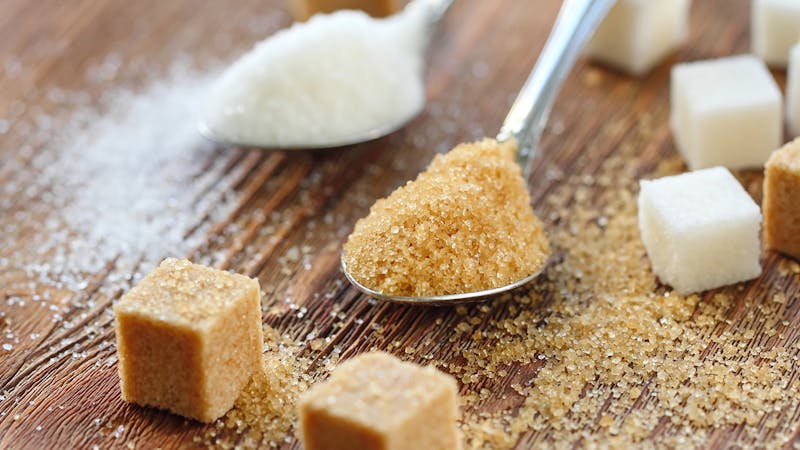A comprehensive guide to salt
“The salt of the earth.” “Worth one’s salt.” “Salt away” savings. These age-old expressions illustrate the value humans have placed on salt for eons.
More recently, however, salt has gone from something treasured to something feared. Health authorities have been encouraging us for decades to cut back on this once-prized substance, especially for lowering blood pressure and decreasing heart disease risk.
But are low-sodium diets necessary — or even safe — for everyone? Read on to learn more about salt and how much of it we should be eating, based on the best current evidence.
This guide is written for adults eating a low-carb diet who are concerned about salt intake and health.
Discuss any lifestyle changes with your doctor. Full disclaimer
1. What is salt?
When you hear the word “salt,” you probably picture a typical salt shaker filled with the white, crystalline substance that’s added to food for seasoning purposes. Originating from seawater, evaporated lakes, or mines deep beneath the earth, salt not only brings out flavors in foods, but it’s also used as a preservative and plays an important role in curing, smoking, pickling, and processing food.
For centuries, salt was a precious commodity that was traded for gold. In fact, the term “salary” comes from salarium, the Latin word for salt.
Salt vs. sodium: What’s the difference?
Although frequently used interchangeably, salt and sodium aren’t the same thing — an important distinction when discussing daily intake. Sodium is a mineral that is found naturally in small amounts in many foods such as meat, milk, yogurt, certain tropical fruits, and vegetables like artichokes, celery, beets, and seaweed.
Salt is sodium combined with chloride, another mineral. Since sodium chloride is roughly 40% sodium, 5 grams of salt (about 1 teaspoon) contains about 2 grams of sodium. According to one study, salt added to processed foods accounts for about 70% of our daily sodium intake.
Some sodium also comes from baking soda (sodium bicarbonate) in baked goods, crackers and cookies.
In short, sodium is the essential mineral our body uses, but salt (sodium chloride) is the dominant way we ingest that mineral.
Different types of salt
Salt is found on every continent, and edible forms are available in dozens of varieties. Here are a few of the most popular:
- Table salt: Known as rock salt, or halite, it is mined from underground deposits resulting from the evaporation of ancient seas. Rock salt can be used for curing meat or pulverized to a fine texture to create table salt. To prevent goiter and other problems caused by iodine deficiency, manufacturers typically add iodine and label their salt as iodized.
- Sea salt: Coarser-grained, flakier, and more subtly flavored than table salt, sea salt comes from evaporated present-day seawater. It may sometimes contain natural traces of iodine.
- Himalayan salt: Harvested from salt caves in the Himalayan mountains of Pakistan, this colorful salt ranges from off-white to deep pink and contains minuscule amounts of trace minerals despite common claims of larger amounts.
- Kosher salt: Its large size and coarse texture is used in the koshering process to draw fluids out of meat. Kosher salt is never iodized.
Although some forms are less processed than others and differ slightly in taste and trace mineral content, from a nutritional point of view, salt is salt, or sodium chloride (NaCl). Most salt substitutes are a mix of sodium chloride and potassium chloride (KCL).
2. Why do we need salt?
Sodium is an essential nutrient that must come from your diet because your body can’t make it on its own. As the most concentrated electrolyte in your blood, sodium helps:
- maintain the delicate chemical and fluid balance in and around your cells
- maintain blood pressure
- contract muscles
- conduct nerve impulses
Sodium levels in your body are tightly regulated by your kidneys, central nervous system, and adrenal glands to make sure it doesn’t go too high or too low. In fact, normal dietary fluctuations in sodium intake will usually have no effect on the concentration of sodium in your blood.
3.The controversy over salt intake
What is a “healthy” daily sodium intake? It seems like a simple question, yet it’s one that’s generated quite a bit of controversy over the past several decades.
According to major health organizations in the US and Europe, nearly all of us consume too much sodium on a regular basis, mainly from processed foods.
- For instance, the 2015-2020 Dietary Guidelines for Americans specify that people should eat no more than 2.3 grams (2,300 mg) of sodium per day — the equivalent of about 1 teaspoon.
- The American Heart Association goes even further, saying that everyone should ideally consume less than 1,500 mg of sodium (approximately ¾ of a teaspoon) daily. Most people would consume that much by just eating a bowl of soup or a Caesar salad.
- The World Health Organization (WHO) recommends that we cap our salt intake at 5 grams of salt per day, which at first glance seems quite a bit higher than the amounts above. However, remember that salt is only 40% sodium. Therefore, the WHO’s guidelines call for limiting sodium to 2,000 mg per day.
Other experts have also been saying that too-low sodium intake may have unintended adverse health consequences.

The salt guidelines are too restrictive, say experts
News Is it really necessary to lower your salt intake as much as the current guidelines advise, in order to lower your blood pressure? According to a new expert paper, the guidelines are way too restrictive and not based on enough evidence.
4. Research on salt intake in healthy adults
Is there any evidence that following a low-sodium diet, when healthy, can help decrease your risk of developing chronic disease or dying? The answer may surprise you.
Systematic reviews and meta-analyses of RCTs from 1996, 2011, and 2017 all showed no benefit of salt restriction among people with normal blood pressure.
Further, a 2019 meta-analysis of meta-analyses and RCTs from Annals of Internal Medicine confirmed the lack of any effect of salt restriction on all-cause mortality and cardiovascular mortality, although the certainty of evidence was deemed to be low.
One large 2020 observational study, which constitutes a weaker level of evidence, nonetheless showed that higher sodium intake correlated with longer life expectancy and decreased all-cause mortality.
With meta-analyses of RCTs showing no benefit to salt restriction and some observational data showing better life expectancy with greater salt intake, can we consider the issue settled?
Unfortunately, no. Many observational studies and RCTs have consistently shown that sodium reduction lowers blood pressure, considered a surrogate marker for the risk of problems like heart attack and stroke. And some studies have shown an improvement in cardiovascular risk with reduced sodium intake.
Nevertheless, when evaluating the entirety of the evidence, we believe it is important to note that small reductions in blood pressure do not consistently track with a reduced risk of the hard endpoints we care about, like heart attack, stroke, and death.
Based on all available data, it seems likely that there is a U-shaped relationship between salt intake and disease or death, with elevated risks at the very lowest and very highest intakes.
Could limiting salt actually harm healthy individuals?
As we said above, we believe that there may be excess risk at the very lowest and highest intakes of sodium, but the data are mixed.
One group of researchers conducted a review of both observational studies and RCTs and concluded that sodium restriction has no detrimental effects in healthy people and could potentially benefit some people. Therefore, they feel a low-salt diet is advisable for all.
This finding was questioned by the PURE study, which reviewed data on sodium intake from over 100,000 people living in 17 countries. This study found that excreting less than 3,000 mg of sodium per day was associated with an increased risk of heart attack and death in people whether or not they already had elevated blood pressure.
In earlier analyses by the same researchers, consuming between 3 and 6 grams of sodium daily was linked to the lowest risk of heart disease and early death.
While observational data like this cannot prove that sodium intake is either a risk factor or a protective factor for heart disease, it does suggest that diets with 3 to 6 grams of salt a day could be part of a healthy lifestyle. For more discussion about this, listen to cardiologist and Diet Doctor’s medical director Dr. Bret Scher discuss the PURE study findings with one of its principal investigators Professor Andrew Mente.
In 2017, a coalition of three European health organizations recommended an upper limit of 5,000 mg of sodium per day for most people — more than twice as much as the 2,300 mg guidelines that come from other major health organizations.
Again, given the evidence for a U-shaped relationship between sodium intake and the risk of health problems, we believe that healthy people will likely not benefit from significant sodium restriction. Likewise, when following a standard Western diet, it seems advisable to keep sodium intake moderate to avoid excess risk.
As for those following low-carbohydrate or ketogenic diets, we don’t know if the available evidence applies; click the green button below to explore the nuance.
5. What about salt intake in people with medical conditions?
Recommendations to reduce sodium intake are so pervasive that one could assume the research must consistently demonstrate that low-sodium diets markedly improve various medical conditions. In truth, the effect of sodium restriction is often more modest than one would think; plus, much of the evidence has been contradictory or inconclusive.
Let’s take a closer look at the evidence for salt restriction as it relates to common chronic diseases:
Hypertension
Hypertension is the medical term for high blood pressure. It currently affects almost one in three people and is especially common in older, overweight or obese individuals.
Is there overwhelming evidence that salt restriction significantly lowers blood pressure for everyone? No, not really, for a few reasons:
- Not everyone is salt sensitive. Eating a lot of sodium doesn’t significantly raise blood pressure in everyone, including those with hypertension. A person whose blood pressure increases after eating salt is said to have “salt-sensitive hypertension.”
It’s estimated that about 50% of those with hypertension and 25% of individuals with normal baseline blood pressure are salt sensitive, meaning their systolic blood pressure increases by at least 5 points following a high-sodium diet compared to a low-sodium diet.
Therefore, higher sodium intake may not increase blood pressure in about half of all people with hypertension. As we discuss next, salt restriction will also not lower blood pressure in this population. - Reducing sodium intake may decrease blood pressure, but only slightly. The highest quality data have found that for most hypertensive adults, sodium restriction doesn’t lead to a dramatic decrease in blood pressure.
In practical terms, going from 3,500 mg to 1,500 mg of sodium per day might reduce systolic blood pressure by an average of 5 points. Although this modest change may be viewed as a statistically significant reduction in risk by researchers, individuals may question if sustaining this level of sodium restriction is worth the effort and inconvenience.
Could this small reduction in blood pressure explain the small reduction in cardiovascular mortality seen in two meta-analyses of RCTs? It is possible. It is also possible that the smaller percentage of people who are salt sensitive had a greater effect, and thus saw an improvement in mortality. Unfortunately, the data do not specify this degree of detail.
- Sodium restriction may have adverse effects. Cutting back on salt may have a negative impact on other health markers in hypertensive adults.
In a very large review of 185 clinical studies, people with hypertension who followed a sodium-restricted diet for two or more weeks experienced a 3.5% decrease in blood pressure, on average.However, this came at the expense of an increase in triglycerides and in the adrenal hormones aldosterone, adrenaline and noradrenaline, which could potentially lead to health problems over time.What’s more, the response to sodium restriction in hypertensive individuals seems to include increased insulin resistance, regardless of whether they are salt sensitive.
It is therefore important to realize that salt reduction is not without potential adverse effects, thus making general population recommendations more challenging.
- Overall diet may affect blood pressure as much as salt does. Other researchers have suggested that rather than restricting sodium intake, those who are salt sensitive should be provided with tools to improve the quality of their diet, promote weight loss, and decrease insulin resistance, which could help make them less salt sensitive and reduce their disease risk.While it may not be the only beneficial approach, a very-low-carbohydrate, ketogenic diet may significantly decrease blood pressure in those who are overweight or have metabolic syndrome, regardless of the diet’s sodium content.

How to normalize your blood pressure
GuideElevated blood pressure is a common health issue today. Almost a third of U.S. adults have high blood pressure – perhaps you or someone in your family does? High blood pressure isn’t necessarily something you can feel, but it increases the risk of serious conditions such as strokes and heart attacks.
Heart disease
Heart disease, also known as cardiovascular disease (CVD), is a broad term that includes several disorders. People with CVD are generally advised to reduce their salt consumption as part of a “heart healthy diet,” but here is what the research has found:
- Atherosclerosis:
A systematic review and meta-analysis of 11 randomized controlled trials (RCTs) concluded that reducing sodium by an average of 3,000 mg per day improved arterial elasticity.
By contrast, several large observational studies have found that very low sodium intake is associated with worse cardiovascular outcomes.While these associational data do not prove cause and effect, it has been hypothesized that the poor outcomes are due to the aldosterone and adrenaline increases discussed previously. Of course, we need to balance these observational studies with those mentioned previously that do show a small reduction in cardiovascular outcomes.
At a minimum, the lack of RCT hard outcome data and the contradictory observational studies should trigger a healthy dose of skepticism that reducing salt intake is necessary for reducing the risk of heart attack.
- Congestive heart failure:Individuals with CHF are usually told to minimize sodium intake in order to prevent fluid overload.
However, this seems to be based mostly on longstanding clinical dogma and experience, without the backing of strong research.In fact, in 2018, investigators performed a systematic review of nine RCTs and concluded that there isn’t enough high-quality evidence to either support or refute the benefit of sodium restriction for CHF.
And a 2022 RCT reported no difference in clinical events with very low or standard sodium intake.As a result, some in the medical community are rethinking whether patients with CHF benefit from very-low-sodium diets.
Based on inconsistent results across studies, it’s possible that some people may be more sensitive to sodium’s fluid-retaining effects than others. Although more research is needed, individualized sodium recommendations, as opposed to the application of general guidelines, may be most appropriate for managing CHF.
Diabetes and prediabetes
Since people with diabetes are at increased risk for both heart and kidney disease, they are usually advised to limit their salt intake. At one time, the American Diabetes Association recommended that individuals with diabetes aim for less than 1,500 mg of sodium per day; however, this was modified to 2,300 mg per day in the 2019 Standards of Care in Diabetes based on the lack of evidence supporting further restriction.
Overall, the evidence to date seems to suggest that salt restriction doesn’t improve diabetes outcomes.
- Observational studies suggest potential increase in heart disease and mortality risk. One 2011 study found that people with type 2 diabetes who consumed the least sodium had an increased risk of early death from heart disease or other causes compared to those who consumed the most sodium.Another 2011 study in people with type 1 diabetes reported that both the highest and lowest intakes of sodium were linked to an increased risk of early death and developing kidney disease.
- Experimental study outcomes are mixed. Of the few RCTs available, some have found that sodium restriction may lead to small improvements in blood pressure and kidney function in people with type 2 diabetes.High-quality research on salt restriction in type 1 diabetes is even more scarce, but two small studies suggest that restricting salt may have adverse effects on kidney health.
Although a meta-analysis of RCTs in people with type 1 and type 2 diabetes found that sodium restriction helped reduce blood pressure, the largest effects were seen in people with normal blood pressure, for whom further blood pressure reduction might be of limited or no value. In addition, the median duration of salt restriction was one week; we know from longer trials that the effect of salt restriction on reducing blood pressure tends to wane over time.
- Health risks of high sodium intake may depend on blood sugar control. One study in Japanese men with type 2 diabetes found an association between higher sodium intakes and greater heart disease risk, but this only applied to those with extremely poor diabetes control (HbA1c of 9% or greater); no relationship was found between high salt intake and CVD in those with lower HbA1c’s.
- Increased insulin resistance: Controlled studies have found that eating too little salt may worsen insulin resistance in adults with type 2 diabetes or exacerbate impaired glucose tolerance in people with prediabetes.Remember that sodium restriction may triggers the adrenal glands to release aldosterone and noradrenaline, which may lead to reduced insulin sensitivity.
In short, avoiding very high sodium intakes greater than 6 grams a day (15 grams of salt) may be beneficial for people with diabetes who have salt-sensitive hypertension. Sodium restriction in everyone else with diabetes, however, is less proven and has the potential to do more harm than good.
Kidney disease
The National Kidney Foundation advises people with kidney disease to limit their sodium intake to less than 2,000 mg per day.
A recent meta-analysis of RCTs found that sodium restriction in people with early to end-stage kidney disease can significantly lower blood pressure and reduce urinary albumin.
And an observational study found that consuming more than 4,500 mg of sodium daily (11 grams of salt) was associated with increased risk of CVD, heart attack, and stroke in people with chronic kidney disease. A wide range of sodium intakes below this level were all linked to lower risk.
Therefore, for this group, moderate sodium restriction – below four grams per day – may be beneficial. Moreover, this level of sodium intake may be easier to sustain than some of the more extreme targets for salt restriction that have been proposed.
6. Is salt the real culprit?
Processed foods
According to health organizations, high amounts of sodium in processed foods have played a major role in the epidemics of heart disease and other cardiometabolic conditions. In addition, analyses of RCTs suggest a benefit from reducing salt consumption.
However, what if it isn’t the sodium but rather the sugar and refined carbs that are responsible for most of the effects of highly-processed food? Unfortunately, the research does not do a great job of teasing this out.
Some researchers have suggested that sugar rather than sodium is the main driving force in hypertension, while others say that it’s a combination of sugar and salt.
In addition, it’s important to remember that diets higher in carbs and sugars lead to higher insulin levels, and higher insulin levels cause more sodium retention by the kidneys. Therefore, it’s quite possible that the amount of sodium we consume becomes more important as we consume more carbohydrates, and less important as we move toward a low-carbohydrate diet.
We know that reducing carbs can lower blood pressure, decrease CVD markers, help reverse diabetes, and promote weight loss — even with moderate to high sodium consumption.
Potassium intake
Higher potassium intake is well-known to correlate with lower blood pressure, even at higher levels of sodium intake.
Some studies suggest that the sodium-to-potassium ratio is better at predicting cardiovascular disease and death than the intake of either nutrient alone.
It’s not clear if the observed benefit of increasing potassium is entirely due to potassium versus other beneficial substances found in potassium-rich foods.
How much potassium must one consume to see blood pressure-lowering effects? Although the United States recommended intake for this purpose is 4700mg, there appears to be good evidence for substantial benefit starting around 3500mg.
Given the fact that a standard Western diet tends to be very low in potassium-rich foods (e.g. fruits and vegetables) and very high in sodium, it is conceivable that some of the harm attributed to excessive sodium is actually attributable to insufficient potassium consumption.
And, have you heard the advice that you should eat more bananas to get more potassium? Don’t do it! These foods are healthier choices for potassium-rich foods.
-
Avocados
Beet greens
Spinach
Beans or lentils
Squash
7. Summary: How much salt should you eat?
Both published research and anecdotal evidence have shown that the response to salt intake varies from person to person.
If you have salt-sensitive hypertension, congestive heart failure, or kidney disease, it may be best to avoid eating more than four grams of sodium per day. However, the amount that’s best for you may require some experimentation, in coordination with your medical provider. Also, keep in mind that eating a high-quality, carb-restricted diet may potentially improve blood pressure, cardiovascular function, and kidney health much more than restricting salt.
If you don’t have any of these conditions, there isn’t any convincing evidence that sodium restriction is beneficial when following a minimally processed low-carb diet.
Consuming about 4 to 7 grams of sodium (about 2 to 3 teaspoons of salt) per day is where many people in the low-carb community will feel and perform the best.
Finally, remember that it’s always good advice to replace highly-processed, low-quality food with minimally-processed, nutritious food. On that, we can all agree.



